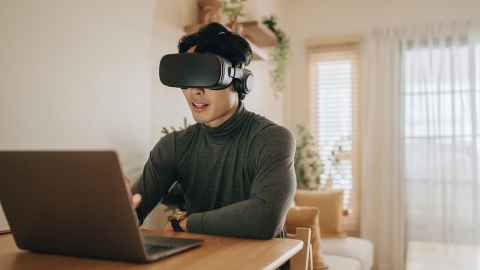The new open home: study reveals benefits of virtual reality
12 October 2022
A study utilising more than 4000 housing transactions has found that virtual reality can reduce a property’s time on the market and increase physical inspections.

Virtual reality can be game-changing when it comes to marketing and selling homes, according to a study by University of Auckland researchers.
Properties that offer virtual reality tours attract an additional 72.3 percent prospective buyers to on-site inspections compared to properties that don’t provide virtual reality tours, say Business School researchers Professor Deborah Levy and Dr William Cheung, who, together with co-authors Chuyi Xiong and Michael Allen, utilised data from one of the largest real estate brokerages in China.
"We found that the use of virtual reality in property marketing motivates buyers to physically inspect a property, reduces the property's time on the market, and improves information transparency, narrowing the difference between the asking and transacted prices of a property," says Dr Cheung.
The study data includes residential property sales from 14 districts in Wuhan, and in total, more than 4,000 housing transactions were analysed. The transaction data contains each property's characteristics and whether virtual reality (VR) was incorporated in marketing the property.
In the near future, I believe virtual reality will be commonly utilised here as it is in China for viewing properties. I think it will become the norm.
In addition, the dataset includes detailed social media interactions for each property, including numbers of followers and viewers.
This kind of social interaction information displayed on the property listing pages, especially the number of followers of properties, also helps to increase physical visits, according to the study, with a 1 percent increase in followers leading to a 21 percent increase in potential buyers visiting the houses.
Meanwhile, the use of virtual reality in property listings reduces the time on the market by 6.41 percent. It can also enhance market transparency, resulting in the narrowing of the bid-ask price spread by 2 percent.
Levy and Cheung believe New Zealand will soon catch up to overseas players already utilising virtual reality to market properties.
"We can all benefit from this tech," says Levy. "It's efficient - you can sit at your computer and have a nosy from the comfort of your home, so there's fun in that, but it also gives you much more of a real-life feel of a property before you have to go and spend time and money looking in person.
“In the near future, I believe virtual reality will be commonly utilised here as it is in China for viewing properties. I think it will become the norm."

Cheung says a virtual home tour is a relatively inexpensive endeavour for potential buyers who can purchase affordable headsets starting at around $30 for use with a smartphone.
The investment for real estate companies looking to offer VR experiences in New Zealand will, of course, be more substantial, says Cheung.
“I did a lot of VR tours of apartments in China - these 3d virtual tours are very sophisticated and provide a high-quality experience of the property.
“This technology is making it easier for many people to find their dream home."
Media contact
Sophie Boladeras | Media adviser
M: 022 4600 388
E: sophie.boladeras@auckland.ac.nz